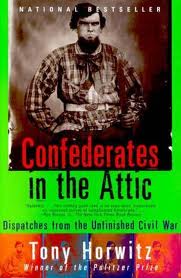The Brown Baggers book group read and discussed Tony Horwitz’s “Confederates in the Attic: Dispatches from America’s Unfinished Civil War.” The discussion was lively as always. The subtitle directs us to the primary theme of this well written and fascinating nonfiction book. The group spent most of our time wrestling with this theme. How can many in the South still fight the Civil War?

Most of us admitted to being Yankees (or “Northern Sympathizers”) – I did not admit to this but on that later – and, before reading the book, could not understand this Southern mindset. A number of the group felt that they had more understanding, if not more sympathy, for this idea after reading Horwitz’s book. His writing style is relaxed, straight forward, and entertaining. He writes as a journalist leaving his opinions of people and places out. We are left to our own thoughts and images as we read along.
Now I must say that I have been a “Southern Sympathizer” and can understand why there are Southerners who feel that the North is still an aggressor. This is a sentiment that I don’t share, but as a child with a grandmother from Charleston (a family house on the Battery) and rural South Carolina and a mother from Tennessee, I was keenly aware that my family felt the South was considered different from and inferior to the rest of the country.

In my Western Pennsylvania elementary school I loved defending the South as underdog when we studied the Civil War and became a “Civil War” nut like those we read about in Horwitz’s book – fascinated with battles and generals. I loved Robert E. Lee as much as I loved horses at that time. Of course Traveller, Lee’s war horse, was the BEST! Later in life a long Minnesota winter gave me the time to read Douglas Freeman’s 3 volume “Lee’s Lieutenants: A Study in Command.” More recently I enjoyed reading Richard Adams’ book “Traveller: A Novel” in which he gives Traveller a voice to reveal his wartime adventures and thoughts.

When my friends went to New England for high school, I went South to Richmond whereIcould live the South. What actually happened during my Virginia high school and college years was that I grew to love Virginia as place and pulled away from Virginia as confederate capitol. I learned to consider the South with its many nuances, not just the “confederates in the attic” nor the “Northern” perspective. Ellen Gilchrist, a Southern writer, once said that the southern accent “falls gently on the ear.” The South itself does have a gentle quality that Horwitz may have missed.
Save your Dixie cups – the South will rise again.
~ Reluctant Blogger
Thank you for the update; I’m sorry I missed this discussion, it sounds like it was fun. It’s the Memory that seems important to Southerners, which may be analogous to the Heroic Memory of the Ancient Greeks to the Classical Greeks. The CSA appears to be a paradigm holder to the southern imagination, which the north lacks. The north’s memory — or memories — seem fragmented, culturally; whereas the south’s seems more firm and salient, graspable, and therefore readily assimilable. There’s more of a coherency to the ideals and purpose of the southern culture — for it was a culture, distinctly different from the industrial north. Perhaps this provides a wish-fulfillment to the imagination and a romantic escapism. It would appear, though, that some individual fantasies loom larger than most.